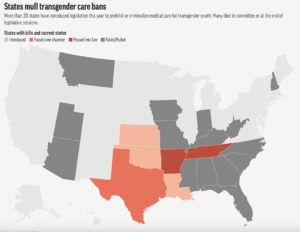While the 2021 state legislative session has produced more anti-LGBTQ legislation than any previous year — often supported by evangelical Christians — many of the anti-transgender bills have failed in statehouses.
The latest setback for anti-transgender bills came in Texas last night, when at the stroke of midnight Senate Bill 29 died in the House of Representatives. Had this bill been put up for a vote and passed, Texas would have joined Arkansas, Alabama, Tennessee, Mississippi, Montana and West Virginia in prohibiting transgender athletes from participating in sports teams matching their identified gender.
Other Texas bills targeting transgender persons and their health care already had died in the Texas Legislature, but not without weeks of contentious debate and committee hearings.

Graphic by Associated Press
The Human Rights Campaign reported that so far this year, 17 anti-LGBTQ bills have been enacted into law, surpassing 2015, which held the previous record with 15 bills enacted. The 17 bills that have become law in eight states were among 250 bills filed seeking to restrict the rights of gay, lesbian, bisexual and transgender persons in various ways.
In addition to the sports ban bills, successful efforts include four religious refusal bills passed in Arkansas, Montana and South Dakota, two anti-LGBTQ education bills passed in Tennessee and Montana, plus a highly controversial bill in Arkansas that prohibits gender-affirming medical care for transgender minors.
Among at least 30 states considering anti-LGBTQ bills, Arkansas and Tennessee were notable for passage of anti-transgender and anti-LGBTQ legislation.
The Associated Press reported that “no state’s political leaders have gone further than Tennessee in enacting new laws targeting transgender people” this year.

Bill Lee
“Lawmakers passed and Republican Gov. Bill Lee signed five new bills into law, consistently dismissing concerns that they discriminate against an already vulnerable population, that some of the laws are unworkable and that they could damage the state’s reputation,” AP said. “Supporters defend the laws policy by policy, arguing that one protects parental rights, others protect girls and women and one even improves equality. Opponents reject those claims.”
Lee is up for re-election next year, and the state showed strong support for former President Donald Trump in the 2020 election.
Tennessee banned transgender athletes from playing girls’ public high school or middle school sports and will become the first state to require government buildings and businesses that are open to the public to post signs if they let trans people use gender-specific public restrooms.
Public schools in Tennessee will now face lawsuits if they let transgender students or employees use multi-person restrooms or locker rooms that do not reflect their sex at birth. School districts must alert parents 30 days before students are taught about sexual orientation or gender identity, letting them opt out of the lesson.
The Heritage Foundation and Alliance Defending Freedom have led a coordinated nationwide effort on such bills, even offering model legislation that gave a carbon-copy feel to the bills proposed from state to state.

John Cooper
Not all Tennessee civic leaders are thrilled about the state’s new reputation. Among the concerned is Nashville Mayor John Cooper, who specifically spoke against the law requiring restroom signage.
“This law is part of an anti-LGBT political platform of hate and division,” Cooper told AP. “One of the risks for Nashville is that the hostility inherent to these signs can be the equivalent of hanging up another sign: a ‘Do not come here’ sign. We are an inclusive city, and that won’t change.”
Back in Texas, where the anti-trans sports bill failed at the last hour, officials with the organization governing high school athletics statewide said they knew of no cases of transgender athletes disrupting Texas school sports.
Yet this and other LGBTQ legislation were among the top-priority bills for the Texas Republican Party.
The advocacy group Texas Values warned: “Women deserve to compete on a level playing field and shouldn’t be spectators in their own sports.”
The Texas Tribune reported that Jill Glover, who chairs the Texas Republican Party legislative priorities committee, said “Children and Gender Modification” was the third-highest-rated priority when delegates to the Texas GOP convention ranked them last year. “She also pointed out that 95% of Republican primary voters in 2020 voted for a ballot proposition that expressed support for outlawing such treatments for minors,” the Tribune said.
Related articles:
Anti-transgender bills introduced in more than a dozen state legislatures


